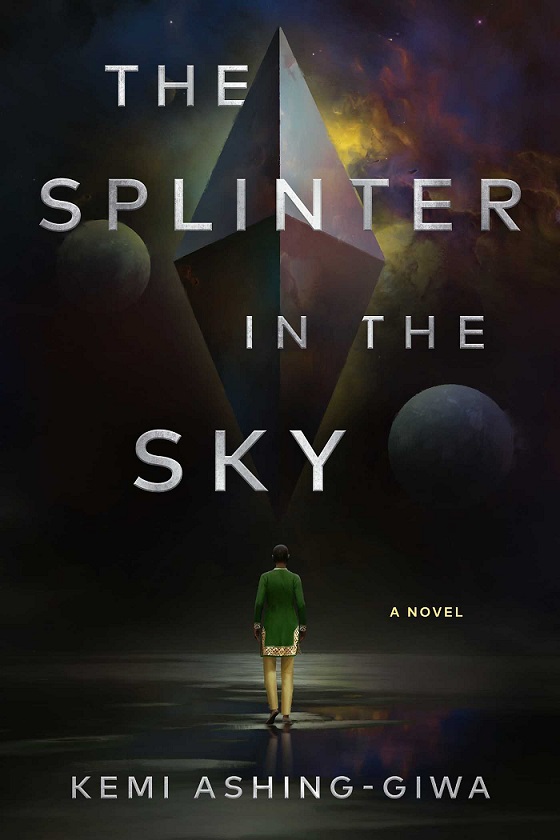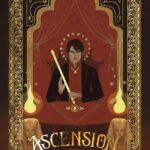
Genres: Queer Protagonists, Sci Fi
Representation: Asian-coded sapphic MC, F/F, secondary nonbinary character
PoV: 3rd-person, present-tense
Published on: 11th July 2023
ISBN: 1668008491
Goodreads

A diverse, exciting debut space opera about a young tea expert who is taken as a political prisoner and recruited to spy on government officials—a role that may empower her to win back her nation’s independence—perfect for fans of N.K. Jemisin and Nnedi Okorafor.
The dust may have just settled in the failed war of conquest between the Holy Vaalbaran Empire and the Ominirish Republic, but the last Emperor’s surrender means little to a lowly scribe like Enitan. All she wants is to quit her day job and expand her fledgling tea business. But when her lover is assassinated and her sibling is abducted by Imperial soldiers, Enitan abandons her idyllic plans and weaves her tea tray up through the heart of the Vaalbaran capital. There, she will learn just how far she is willing to go to exact vengeance, free her sibling, and perhaps even secure her homeland’s freedom.
I received this book for free from the publisher via NetGalley in exchange for an honest review. This does not affect my opinion of the book or the content of my review.
Highlights
~let’s hear it for non-traditional family structures!
~when will colonialists realise colonising is cringe (and also evil)
~tea-growing is the chillest hobby
~being a spy for/with/against the Emperor is so very not-chill
~a truly unbelievable number of coincidences
The Splinter in the Sky is an extremely readable, swift-paced sci fi standalone of political intrigue and colonialism. Ashing-Giwa’s prose has that indefinable, engaging quality that soothes the mind and lets the story sweep you away; chapters slip past with comfortable ease, and before you know it, you’ve finished the book entirely!
That being said – hold your horses, tiger. Splinter is a fun read, but comparing it to the works of N.K. Jemisin and Nnedi Okorafor is unfair to it, and pretty misleading for readers. Someone tell the marketing department to calm down, please.
The truth is that Splinter is a little hard to talk about – or rate – because it’s full of contradictions. Not inconsistencies – I spotted no plotholes and had no ??? moments with the worldbuilding, nothing like that. But this is a book that is very straightforward…despite tackling issues like colonialism and the entire plot revolving around secretive political intrigue. The worldbuilding that has gone into the Korikese, Enitan’s people, is original and interesting…but the Empire is incredibly boring and lacking in detail. This is the hardest thing Enitan has ever had to do…but the answers she’s searching for just fall into her lap again and again.
I was disappointed that the titular Splinter – a giant rhombus-shaped flying city – was so dull: everything inside it is just black. Obsidian, onyx, and jet everywhere. There was nothing beautiful or interesting about it, nothing to describe – not even black-on-black carvings or something – which means nothing to picture. It has occurred to me that Ashing-Giwa might have meant for this blankly black monolith to be a metaphor for the dark hollowness at the heart of the empire… But even if that’s so, the effect is incredibly mind-numbing. And – though again, this might have been deliberate, give how many white people complain that we white people don’t have any culture – even aside from the flying city being The Dullest, the actual Empire itself didn’t seem to have much of a culture either, beyond ‘conquer everybody’. There was a little bit about the Emperor being a living god, but the upper classes at least don’t really believe it, and other than that…it all felt so generic. I wanted so much more worldbuilding then we got, and it felt like the plain black aesthetic was a way to make the city eerie and Other without having to imagine and create a new culture. I would love a whole novel (or series!) set among the Korikese, because their world and culture sounds so incredibly interesting, but we barely got to see them at all, and the Empire was just…blandly awful.
So that was disappointing.
What actually annoyed me was how convenient everything was. There’s a conspiracy, but the clues and reveals required to take it down barely need to be looked for before they manifest, neatly wrapped and helpfully labelled with pretty little bows on top. The secret puppet-masters of the Empire don’t come across as particularly good at their scheming when a rube from the provinces – so to speak – can uncover them so quickly and easily. By the time I was halfway through the book, I was frustrated; but some of the coincidences that came in the lead-up to the climax were just beyond belief. What’s worse is that the worst of them weren’t even plot-relevent; they could have been cut without impacting the story at all. GAH!
But none of this can outweigh the fact that Splinter in the Sky is fun. Books that you can just disappear into are worth their weight in gold; particularly books that you can disappear into even when your brain is misbehaving. When I was restless and twitchy and couldn’t focus on anything, Splinter in the Sky was a story I could vanish into with no effort at all. It’s powerfully immersive, delightfully moreish, and requires nothing from the reader but the time it takes to read it.
We don’t have enough books like that.
So yes, I can nitpick all day, but ultimately, Splinter‘s flaws are irrelevant. It’s purpose is to entertain, and it does that exceedingly well. And if you’re willing to be entertained, I think you will be.






Leave a Reply